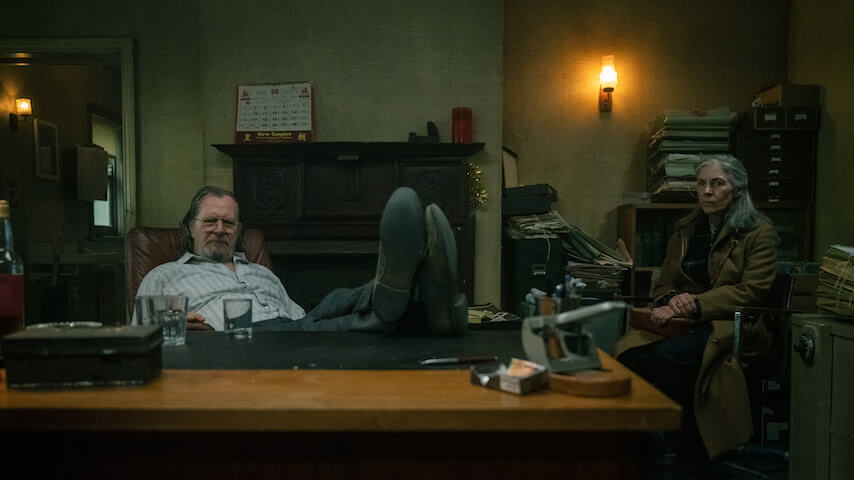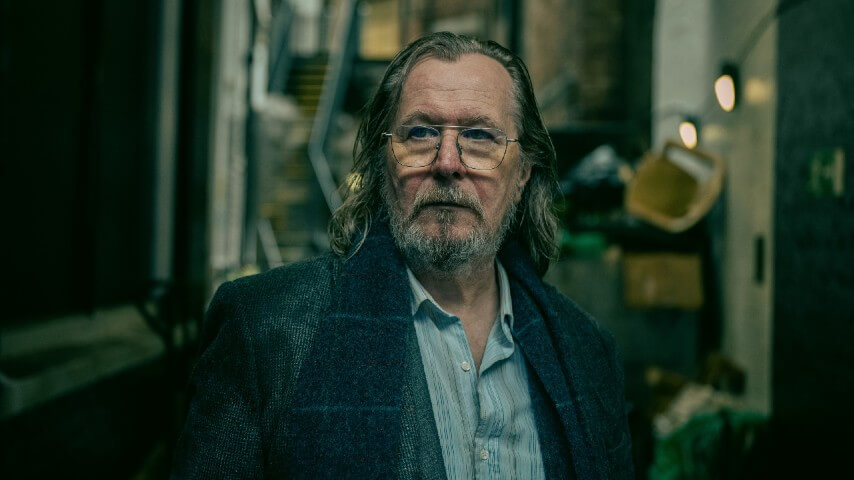[Editor’s note: In the run-up to the Emmys, we’re revisiting interviews we did with some of this year’s nominees. This interview with Slow Horses‘ Gary Oldman, who’s up for Outstanding Lead Actor In A Drama Series, originally published in October 2024.]
Slow Horses is nothing if not consistent. Over just three and a half years, we’ve been treated to four seasons of the Apple TV+ thriller, with each unfolding over six tightly plotted, very funny episodes. And the same can be said of the British spy series’ main character and compass (not the most obviously moral one, exactly, but a compass nonetheless), Jackson Lamb, a smoking, drinking, pissy veteran MI5 agent in charge of a group of fuck-ups at Slough House who is always in need of a wash and (and in spite of all outward appearances) one step ahead of top intelligence brass. As new character Emma Flyte (Ruth Bradley) bluntly puts it early on in the show’s fourth season, which wrapped up on October 9, Lamb is “a man who looks like he gropes people on buses.”
And the great Gary Oldman, who said in 2022 that he may retire with this character and plans to play him as long as the show runs, is clearly having a ball with Lamb, spitting insults at underlings like “He’s not dead, you dickhead,” grossing out most people he runs into for his own amusement, and—especially this season—showing just the slightest hint of caring for the ragtag group of spies he begrudgingly inherited (particularly River Cartwright, who’s portrayed, also quite wonderfully, by Jack Lowden).
The A.V. Club spoke with Oldman about the show’s latest season, its themes of fathers and sons, its most impressive directorial feat, and its drama-comedy balancing act.
The A.V. Club: The show has aired four seasons in less than that many years, which is a rarity for a critical TV darling these days. And it’s obviously a time commitment. Why do you keep going back to this show and to Jackson in particular?
Gary Oldman: Well, yeah, I’m very committed to the show. I consider it very much a highlight of my career. It’s a wonderful character [and has] great source material that we do our best to honor each time out. The bonus, really—and the surprise of doing it—is this sort of company feel that we have. It’s the closest I’ve come to the theater in that sense, of having a company. It’s like you have your own sort of conspiracy. You’re a gang, you know? You’re in a club. I’m very fond of them. They’re just an amazing, really lovely group of people who I think have inhabited these characters and just do a brilliant job. So in terms of just the sheer day-to-day working of it, it’s not a chore, not a hardship. I love being around them. I think it’s pedigree stuff. You know, we have this balance between the drama and the comedy aspects. And Jackson is a wonderful creation. I mean, I brought my imagination to it, of course. But on the page, in the books, these characters are all out of the mind of Mick Herron. It’s just a wonderful universe that he’s given us.
AVC: A big theme of this season is fathers and sons, or family and found family. Do you think Jackson, for all of his blustering, looks at his crew as sort of his kids?
GO: Yeah, there is a sort of paternal sort of thing going on. I mean as Gary, I look at them in that way. Jonathan [Pryce, who plays David Cartwright] and I are, you might say, the elder statesman. We’re the veterans, if you like, that have been doing it the most. And a lot of these young actors that are on the show, I look at some of them like I might look at my own kids or something, you know what I mean? And, yeah, the thing about Lamb is that he always gives the impression that he doesn’t care, and he probably cares more than most. And there’s certainly an element of that with River Cartwright. He sees the potential of River, that he could be a very good spy. But part of him probably wants River not to be a spy and follow in his footsteps because the game of spying has really messed up Lamb. But yet, there’s the baggage of the family and David Cartwright, who he despises, so he’s reminded of that all the time. So that’s the sort of delicious cocktail of it all, you know? But [he’s] very much a sort of parent of these dysfunctional kids.
AVC: Speaking of Jonathan Pryce, maybe my favorite scene this season is with you, him, and Saskia Reeves in the graveyard. You’re almost acting like his boss when he used to be your boss. What was it like to work on that scene?
GO: Well, to shoot the scene was a nightmare because we just had really bad weather. And it was stop and start, stop and start, stop and start. So we’d be out there, and then the rain would come, and then we’d have to run for cover, because we can’t get hair and makeup and costumes wet. And then the sun would come out, the clouds would come, you know…the rain would start, the rain would stop. So creatively, it was a very frustrating day to shoot. But the scene itself is very interesting. It’s a roll of the dice, really. It’s a long shot for Lamb. He hopes that the grave will trigger any kind of memory or get Cartwright talking. Lamb senses or gets an idea that this girl is [David’s] daughter. I think he’s already close to working that out. So it’s very crafty, very cunning on Lamb’s part.
AVC: How do you think the show, or the source material, handled David battling dementia?
GO: Yeah, again, this is Mick Herron being very smart. Isn’t it wonderful to give a man who’s got so many secrets dementia? You know, spies don’t write things down. They can remember. And to give a sort of master spy, as he was in his day, to give him memory loss is just a wonderful device. And then, of course, we wonder, because he had been such a good spy and such a legend: Is the old man faking it? Is it an act? Is it real? So there’s that dynamic going on as well, which I think is really good. And I think Jonathan plays it really well. It’s very touching. It’s very sad.

Gary Oldman and Saskia Reeves in Slow Horses season four (Photo: Apple TV+)
AVC: Another actor who’s great this season is Kristin Scott Thomas, who plays Diana Taverner. Jackson and Diana are so different from the outside, but they’re kind of in the same boat. They both feel a little disrespected, both a little below where they maybe should be. Could you speak to any of those similarities?
GO: You know, when others are playing checkers, Lamb’s playing chess. And I think that if anyone’s up there with him on that level, then it’s probably Taverner. I think he recognizes how really sort of bright she is, but she represents all of that hubris, doesn’t she? And all of that narcissism and all that bureaucratic crap. And of course, she’s a wonderful foil, a lovely sparring partner, and gives as good as she gets. I think he kind of respects that, you know?
AVC: Adam Randall’s direction all season was pretty stellar. Was there a moment where he particularly impressed you?
GO: He’s a star, isn’t he? Adam Randall is very, very talented. I found him—I think we all found him—a delight. But there’s one particular scene that I thought was quite wonderful. You know after the crash, when they take River, when they intercept that convoy? [In episode six] there’s a shot coming down from the building, all the way down, and it then goes into a closeup of Flyte on the telephone, in conversation, and it’s all one continuous shot. So the drone comes down from the top of the building, the camera operator catches the drone wearing Kevlar so he doesn’t get chopped to pieces by the blades and then holds the drone as a handheld camera and then goes into the closeup and follows Flyte. And that was what Adam came up with. If you watch it again, there’s no cut. That was [from] the cameraman catching the drone in midair.


